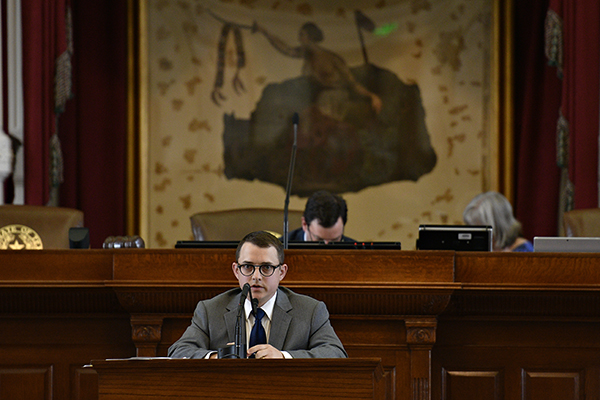The Texas House passed a bill Monday meant to protect freedom of speech and expressive activities on college campuses, but some Democrats say it could prevent universities from intervening if the activities are offensive or hateful.
House Bill 2100 by state Rep. Briscoe Cain, R-Deer Park, passed 82-56 and will now go to the Texas Senate to be heard in committee.
During debate, state Rep. Terry Canales, D-Edinburg, successfully amended the bill to waive a university’s sovereign immunity, a rule that protects universities from lawsuits by requiring the plaintiff to get permission from the legislature to move forward with the lawsuit. Canales’ amendment means universities could be sued for limiting free speech.
“If (a university is) attacking the student body’s ability to exercise their freedom of speech and they’re in violation of the law, they should be held accountable,” Canales said. “Under current law, a university would assert sovereign immunity, and you would not be able to enforce a jury verdict or even get to a jury.”
State Rep. Rafael Anchia, D-Dallas, questioned whether the bill would protect against offensive events put on by university organizations, referring to an event planned in 2013 by the Young Conservatives of Texas at UT called “Catch an Illegal Immigrant.” The event was canceled but received national attention.
“What about at the University of Texas, where you have a group that says, ‘It’s catch an illegal immigrant day?,’” Anchia said. “Can a university shut that down? Or how about ‘catch a Negro day?’ How about ‘catch a gay person day?’”
Canales did not answer Anchia’s question but did say “popular speech isn’t what freedom of speech is about.”
State Rep. Jessica González, D-Dallas, brought a successful amendment to allow universities to decide whether an invited speaker is part of a hate group. The definition of “hate group” would be left to the university.
However, the amendment was withdrawn without explanation.
State Rep. Gene Wu, D-Houston, unsuccessfully proposed an amendment that would clarify terminology in the bill that could prevent universities from taking positions on certain topics.
“This amendment strikes … the requirement that institutions maintain a neutral position on all matters of public concern,” Wu said. “The way it’s defined right now, ‘matters of public concern’ covers everything under the sun … I think this is taking this to an absurd level.”
Wu said “matters of public concern” is vague and could prevent universities from making statements about supporting U.S. troops and encouraging recycling, for example.
Cain said institutions only have to attempt to remain neutral and can still make comments on university operations. Cain said the definition of neutrality is left
to the university’s governing board.
“We’re leaving it to their discretion,” Cain said. “It’s something that they should strive to do, but of course there will be exceptions. For example, they may need to come out and say that ‘date rape is bad’ … because that is part of the exception that (it is) for the institutions’ operations.”





















